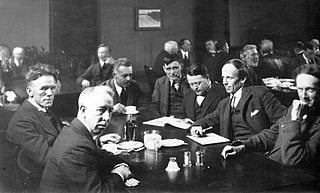
The Group of Seven,once known as the Algonquin School,was a group of Canadian landscape painters from 1920 to 1933,with "a like vision". It originally consisted of Franklin Carmichael (1890–1945),Lawren Harris (1885–1970),A. Y. Jackson (1882–1974),Frank Johnston (1888–1949),Arthur Lismer (1885–1969),J. E. H. MacDonald (1873–1932),and Frederick Varley (1881–1969). A. J. Casson (1898–1992) was invited to join in 1926,Edwin Holgate (1892–1977) became a member in 1930,and Lionel LeMoine FitzGerald (1890–1956) joined in 1932.

Events from the year 1920 in Canada.
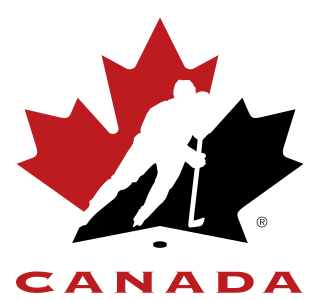
Hockey Canada is the national governing body of ice hockey and ice sledge hockey in Canada. It is a member of the International Ice Hockey Federation and controls the majority of organized ice hockey in Canada. There are some notable exceptions,such as the Canadian Hockey League,U Sports,and Canada's professional hockey clubs;the former two are partnered with Hockey Canada but are not member organizations. Hockey Canada is based in Calgary,with a secondary office in Ottawa and regional centres in Toronto,Winnipeg and Montreal.
There have been various groups in Canada that have nominated candidates under the label Labour Party or Independent Labour Party,or other variations from the 1870s until the 1960s. These were usually local or provincial groups using the Labour Party or Independent Labour Party name,backed by local labour councils made up of many union locals in a particular city,or individual trade unions. There was an attempt to create a national Canadian Labour Party in the late 1910s and in the 1920s,but these were only partly successful.
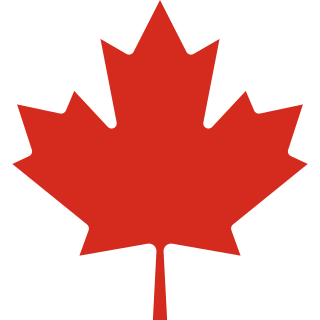
The Canada men's national ice hockey team is the ice hockey team representing Canada internationally. The team is overseen by Hockey Canada,a member of the International Ice Hockey Federation. From 1920 until 1963,Canada's international representation was by senior amateur club teams. Canada's national men's team was founded in 1963 by Father David Bauer as a part of the Canadian Amateur Hockey Association,playing out of the University of British Columbia. The nickname "Team Canada" was first used for the 1972 Summit Series and has been frequently used to refer to both the Canadian national men's and women's teams ever since.

The men's ice hockey tournament at the 1924 Winter Olympics in Chamonix,France,was the second Olympic Championship,also serving as the second World Championships. The competition was held from Monday,January 28,1924,to Sunday,February 3,1924. Canada,represented by the Toronto Granites,defended its championship from the 1920 Summer Olympics. The United States and Great Britain took the silver and bronze respectively,while other contenders included Czechoslovakia,France,and Sweden.
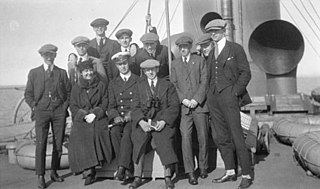
Ice hockey was introduced to the Olympic Games at the 1920 Summer Olympics in Antwerp. The tournament also served as the first World Championships. The matches were played between April 23 and April 29,1920. Canada,represented by the Winnipeg Falcons,won the gold medal. The silver went to the United States and Czechoslovakia took the bronze.

The Canadian Amateur Hockey Association was the national governing body of amateur ice hockey in Canada from 1914 until 1994,when it merged with Hockey Canada. Its jurisdiction included senior ice hockey leagues and the Allan Cup,junior ice hockey leagues and the Memorial Cup,amateur minor ice hockey leagues in Canada,and choosing the representative of the Canada men's national ice hockey team.

Canada competed at the 1920 Summer Olympics in Antwerp,Belgium. 52 competitors,all men,took part in 38 events in 9 sports. These games marked the introduction of winter sports to the Olympic program;Canada won its first gold medal for ice hockey.
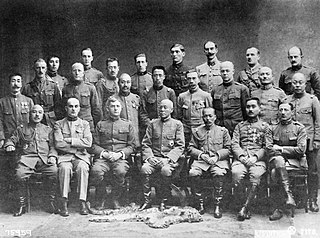
The Siberian intervention or Siberian expedition of 1918–1922 was the dispatch of troops of the Entente powers to the Russian Maritime Provinces as part of a larger effort by the western powers,Japan,and China to support White Russian forces and the Czechoslovak Legion against Soviet Russia and its allies during the Russian Civil War. The Imperial Japanese Army continued to occupy Siberia even after other Allied forces withdrew in 1920.

The Canadian Air Force (CAF) was a contingent of two Canadian air force squadrons –one fighter and one bomber –authorized by the British Air Ministry in August 1918 during the close of the First World War. The unit was independent from the Canadian Expeditionary Force and the Royal Air Force (RAF).
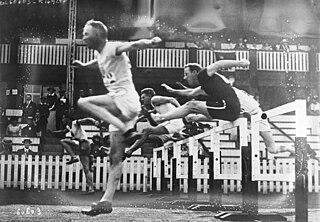
The men's 110 metres hurdles event was part of the track and field athletics programme at the 1920 Summer Olympics. The competition was held on Tuesday,August 17,1920,and on Wednesday,August 18,1920. 24 runners from 15 nations competed. No nation had more than 4 runners,suggesting the limit had been reduced from the 12 maximum in force in 1908 and 1912. The event was won by Earl Thomson of Canada in world record time,the first victory by any nation other than the United States in the men's 110 metres hurdles and the first time that any non-U.S. nation had even been on the podium since 1896. Thomson,who had lived in the United States since age 8,had wanted to run for the U.S. team but was ineligible due to his Canadian citizenship. A British flag was displayed at the medal ceremony rather than a Canadian one because the organizing officials did not have the appropriate flag.

The Dominion Police Force was the federal police force of Canada between 1868 and 1920,and was one of the predecessors of the Royal Canadian Mounted Police. It was the first federal police force in Canada,formed the year following the Canadian Confederation to enforce federal laws and perform policing duties for the Federal Government of Canada. On 1 February 1920,the Dominion Police was merged with the Royal North-West Mounted Police to form the Royal Canadian Mounted Police as the new federal police force of Canada.
Canadian liquor plebiscites,held in 1920 under the Canada Temperance Act and the Dominion Elections Act,were referendums on the strengthening of the Prohibition measures in effect in several provinces of Canada. Voters were asked if they supported banning of importation of liquor across provincial boundaries. The referendums were held on July 10,1920,in New Brunswick;on October 20 in British Columbia;and on October 25 in Alberta,Manitoba,Nova Scotia,and Saskatchewan.
Spedden is a hamlet in central Alberta,Canada within Smoky Lake County. It is located 0.3 kilometres (0.19 mi) north of Highway 36,approximately 106 kilometres (66 mi) southwest of Cold Lake.
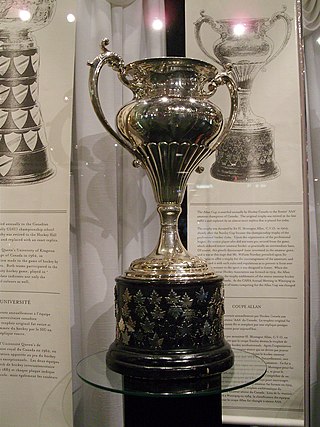
The 1920 Allan Cup was the senior ice hockey championship of the Canadian Amateur Hockey Association (CAHA) for the 1919–20 season.













